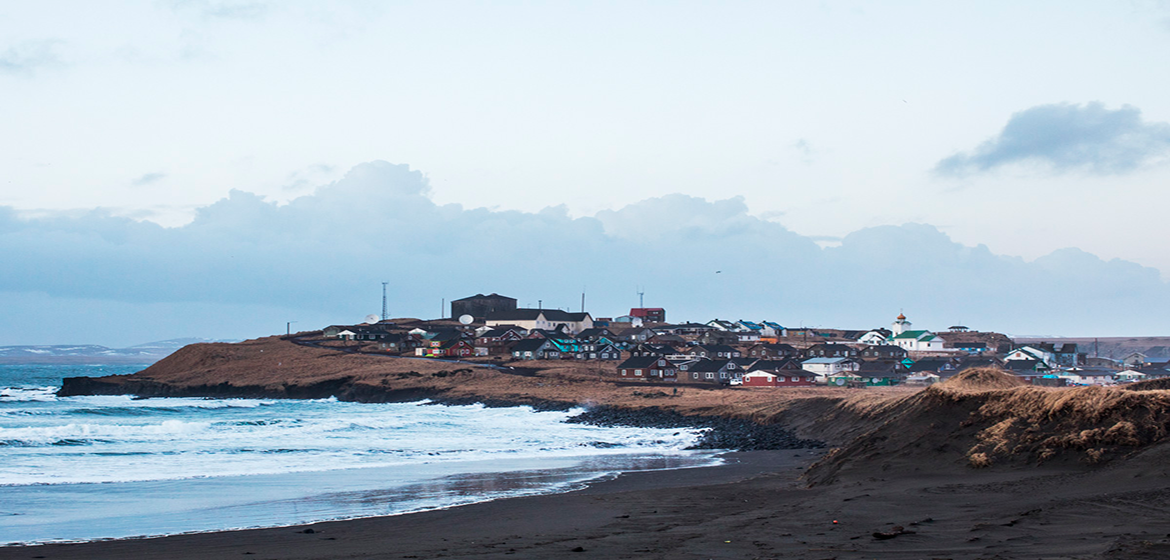By Jill Burke
How a community-based program aids sexual assault victims
A new approach to empowering survivors in remote parts of Indian Country.
A few years ago, while trying to help a sexual assault victim in St. Paul, Alaska, Kristie Traver, 46, found herself in an awful position. The victim needed a forensic exam — all the intrusive, time-consuming procedures that are necessary to build a case. But before any of that could happen, Traver had to scrape together the money for a plane ticket: The nearest community with those specialized services was a three-and-a-half-hour flight away.
Working on St. Paul Island, a 42-square-mile landmass in the Bering Sea, means that such inconveniences and logistical problems are part of Traver’s job as division manager for victim services for the Aleut Community of St. Paul Island. A non-Native, Traver arrived here in 2015 after working with victims of domestic violence in Nevada and elsewhere.
The remoteness of St. Paul, with its windswept lowlands, sandy beaches and rocky cliffs, added urgency and complexity to cases in ways she had never encountered. “It’s three days if you can get them on the flight,” said Traver, a tall, gregarious woman whose wavy brown hair frames her face and glasses. “No showering. No changing clothes. That’s horrible.”
DNA evidence left on the human body is generally considered viable for 96 hours, after which it erodes. People wash their hands, eat and drink, brush their teeth, use the restroom. In this case, nearly a week had passed before the finances and flight schedules lined up — too late for the exam to be of much value for prosecution. “Sorry,” Traver had to tell the victim. “There’s no point in trying to collect evidence.”
“I never want to have to say that to a victim again,” Traver said.
Now, she won’t have to.
Last August, St. Paul became the first community in Alaska to train volunteers to respond to victims and collect evidence. Known as SAFESTAR — for “Sexual Assault Forensic Exam Support, Training, Access, and Resources” — the program was developed by the Arizona-based Southwest Center for Law and Policy to assist Indigenous women. Living on rural tribal lands isolates victims from care, both geographically and culturally, and can often mean hours of commuting to reach medical facilities. Now, tribal communities in Arizona, Kansas, Wyoming, Oklahoma, Alaska and most recently, Massachusetts, can assist victims with local volunteers.
The center pays for trainers and provides the response kits, but otherwise it’s up to each community to decide how to staff and fund SAFESTAR. Many communities rely entirely on volunteers, often counselors, advocates and teachers. They learn about trauma and anatomy, how to photograph wounds and bruises, and how to collect forensic evidence.
Indigenous women experience twice the national average for sexual assault. St. Paul officials believe rates there are even higher, estimating that most women in the community are exposed to sexual violence during their lifetime. Additionally, some women don’t contact police, because speaking up can mean getting a loved one in trouble, challenging a powerful family, or facing an onslaught of victim blaming and shaming. Against this wave of consequences, silence feels safe.
“Until we can break that silence, it will continue,” said Shirley Rice, 60, a trained SAFESTAR volunteer and lead advocate for tribal victim services for the Prairie Band Potawatomi Nation in Mayetta, Kansas.
Each survivor has her own needs, and Rice, a member of the Prairie Band Potawatomi Nation, offers comfort that’s seldom seen in clinical settings. The burning of sage or cedar, a walk to a nearby creek to let the water run over sacred tobacco — these forms of cleansing and healing can help put victims at ease as they talk. For many women, the moral support SAFESTAR provides is as important, if not more so, than establishing a solid forensic case.
The organization that trained Rice, the Southwest Center for Law and Policy, provides volunteers with 40 hours of training and supplies mobile rape kits — everything needed to provide basic first aid, offer emotional support and referrals, and collect forensic evidence.
“Our ability to process sexual assault cases in rural Alaska has always been complicated by not having as many resources available for the collection of evidence,” said John Skidmore, criminal division director for the State of Alaska Department of Law. “Anything that is done to improve that is a step in the right direction.” The state, the St. Paul tribal governments and SAFESTAR volunteers work together to make sure the evidence collected by the program is admissible in court.
SAFESTAR can’t do everything, but Traver sees the program’s power for Indigenous women. “Victims won’t have to wait. They won’t have it looming over them and adding to their trauma,” Traver said. “I’m excited to be able to say, ‘You don’t have to go all the way out there. We can just get it done right now.’ ”
Source:
Related to SDG 5: Gender equality, SDG 16: Peace, justice and strong institutions



